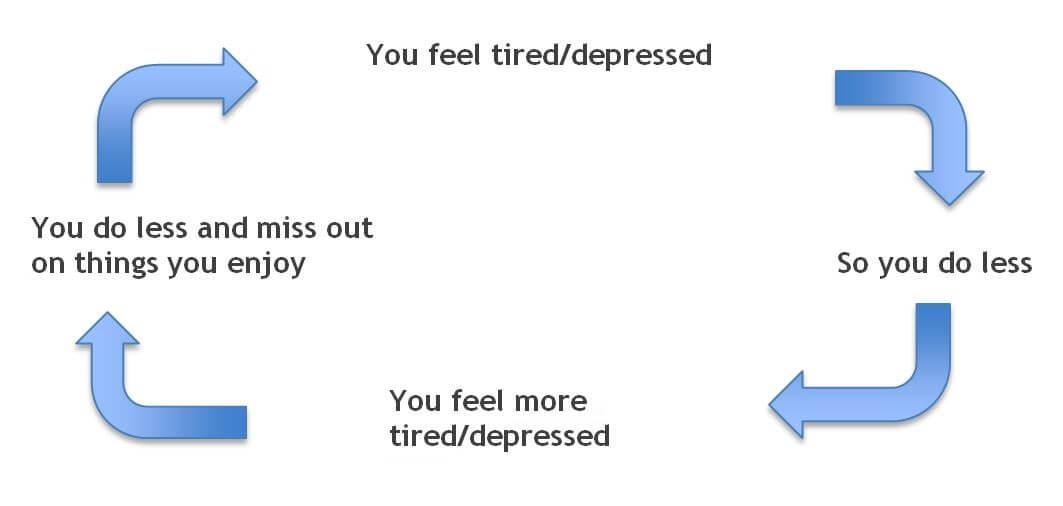Exercise and Mental Health
Table of Contents
Written by Heidi Fettes
Some facts:
- 1 in 4 people suffer from a mental health condition at some point in their lives.
- Depression is among the top five most common presentations to GPs.
- Broadly speaking the less you do the more likely you are to end up with low mood/depression or tension and worry.
Exercise keeps the heart and body healthy

- The mind and body are often treated as if they are separate, but they aren’t. The mind can’t function unless your body is working properly and the state of your mind affects your body.
- Physical activity has an important role to play in improving both physical and mental wellbeing. For example, low levels of cardiorespiratory fitness reduce life expectancy. Cardiovascular disease is common in those experiencing mental illness, and is a frequent cause of death in this group. Being physically inactive is a risk factor in this.
- If you feel low or anxious you may lack motivation and become less active which can make you feel worse. You can get caught in a harmful cycle:

- It is harder to get active when you’re depressed, but being active lifts your mood and gives you a sense of being in control and in touch with other people.
What are the benefits of exercise for people experiencing poor mental health?
- Improved cardiometabolic health (cardiometabolic refers to heart disease, diabetes and stroke)
- Decreased symptoms in depression, anxiety, schizophrenia, bipolar disorder, fatigue, pain.
- Improved self-esteem and sleep quality.
- Improved concentration and focus.
- More likely to cope with cravings and withdrawal symptoms if trying to give up smoking or alcohol.
- More likely to keep mobile and independent as you get older.
- May have fewer problems with memory and dementia.
Why does exercise benefit us?
There are several possibilities:

- Exercise seems to have a positive effect on certain chemicals (neurotransmitters) in the brain, i.e. dopamine, serotonin and noradrenaline. Brain cells use these chemicals to communicate with each other so they actually affect your mood and thinking.
- Exercise can stimulate other chemicals in the brain called “brain derived neurotropic factors.” These help new brain cells to grow and develop. However moderate exercise seems to work better than vigorous exercise.
- One popular theory is that the effects of exercise are due to an increase in the concentration of endorphins. This is the body’s own morphine. Endorphins help to relieve pain and induce feelings of pleasure and euphoria.
- Exercise seems to reduce harmful changes in the brain caused by stress.
How well does exercise work for depression?
- Physical activity involves a change in behaviour. In depression a person’s behaviour is often characterized by passiveness, withdrawal and isolation. Changing behaviour can affect thoughts and emotions and therefore reverse depression. Exercise has been shown to encourage positive thoughts and emotions leading to an increase in confidence in coping, an increase in self-confidence and capacity for self-control.
- For mild depression, physical activity can be as effective as anti-depressants or psychological treatments such as CBT.
How to fit exercise in to your life
Whatever you choose to do, start with something easy, like walking round the block. Build your level up gradually, perhaps by just doing a minute or two more – or a few metres more - each day. Try to do something most days, even if you feel tired.
Practical ways of incorporating exercise into your life:
- Choose a physical activity that you enjoy.
- Walking or cycling to work.
- Taking the stairs instead of the lift.
- Getting a dog and taking it for a walk everyday even when it is raining!
- Exercising with a friend and/or joining a club
- Entering an event and training for it.
- Gardening
References/useful websites/resources:
Related
Anger and Conflict
Conflict in relationships escalate through three stages: complaint is expressing dissatisfaction, criticism involves identifying recurring behavioral patterns, but contempt, the most toxic stage, attacks a person’s character, leading to a destructive ‘you versus me’ dynamic
Awareness Wheel
When discussing an issue, start with sensory data (what you see, hear, feel, etc.), then share your thoughts, feelings, wants, and actions, using “I” statements to provide a clear and complete understanding of your perspective to your listener.
Care for the Family
On the Care for the Family website, there is a wealth of support for family life, focusing on the couple relationship building, parenting challenges, and bereavement assistance, with each section delivering tailored practical and emotional aid.
Emotional Intelligence
Emotional intelligence is crucial as it enhances our ability to understand, manage, and express emotions effectively, fostering better personal and professional relationships and decision-making.
Feeling Words List
A Feeling Words List enhances emotional articulation by expanding vocabulary beyond basic terms, enabling more precise emotion identification and improving communication in relationships.
Helpful Handouts
Here, we’ve gathered a variety of resources that can enhance your understanding of numerous aspects of emotional intelligence in a printable format.
